
Commodus was guilty of many unseemly deeds, and killed a great many people.
(Cassius Dio, The Roman History)
Salvete, history-lovers!
Welcome back to The World of The Dragon: Genesis, the blog series about the research that went into our latest historical fantasy release set in the world of ancient Rome.
If you missed part six, about the Antonine Plague, you can read it HERE.
In this seventh and final part of the blog series, we’re going to be taking a brief look at the children of Marcus Aurelius and Faustina Minor (‘the younger’), the reign of Emperor Commodus, and the plots against his life.
Was Commodus really the monster we imagine him to be, the megalomaniacal ruler we were confronted with in the movie Gladiator?
Read on to learn more.
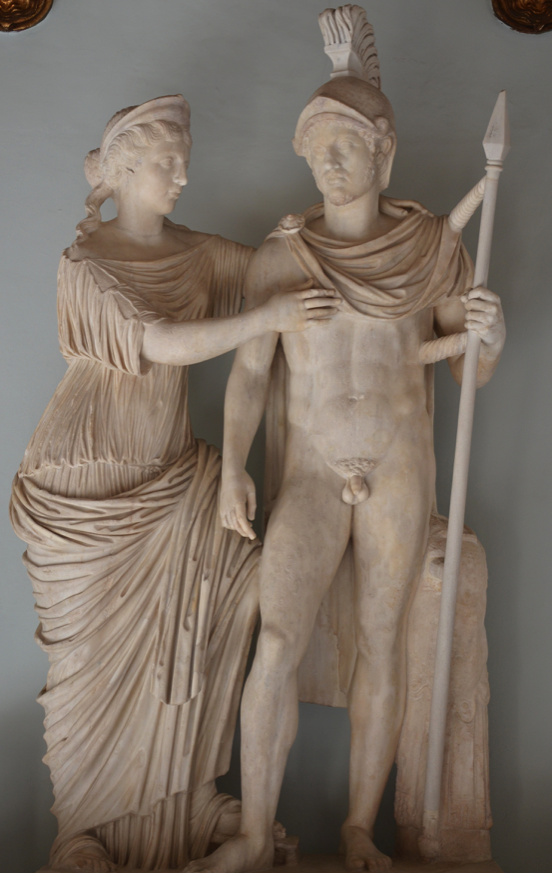
Faustina Minor and Marcus Aurelius as Venus and Mars – Capitoline Museum
Some people view the reigns of Antoninus Pius and Marcus Aurelius as a sort of golden age of rulership in the Roman World. That was certainly true of Antoninus Pius, and perhaps less for Marcus Aurelius’ reign, but any sense of a golden age certainly ended with the accession of Lucius Aelius Aurelius Commodus who ruled as sole emperor from A.D. 180-192.
It was at this time that the Roman Empire perhaps took a turn for the worst. The time of the ‘five good emperors’ was at an end.
Because of popular culture, the two children of Marcus Aurelius and Faustina Minor that most people are aware of are Commodus and his sister, Annia Aurelia Galeria Lucilla, or ‘Lucilla’. However, what many may not know is that Marcus Aurelius and Faustina Minor had thirteen children together over the period of their thirty-year marriage.
Most of these young Aurelii died young. There was the first-born, Domitia Faustina, who died at the age of five in A.D. 151. Then there were Titus Aelius Antoninus and Titus Aelius Aurelius who both died in 149. After the birth of Lucilla in 150, two more children were born, Annia Galeria Aurelia Faustina, and Tiberius Aelius Antoninus who died in 151 and 155, respectively, before another unknown child died in 157. Titus Aurelius Fulvus Antoninus, Commodus’ twin brother, died at the age of four in 165, then Marcus Annius Verus Caesar passed at the age of seven in 169, followed by a young Hadrianus some time after that.
But there were other surviving siblings of Commodus and Lucilla who are not often mentioned in the history books, notably three more sisters: Annia Aurelia Fadilla (c. 159-211), Annia Cornificia Faustina Minor (160-212), and the youngest of Marcus Aurelius and Faustina Minor’s children, Vibia Aurelia Sabina (170-216).
Obviously, infant mortality rates were very high in the ancient world, even for the upper classes. But, in hindsight, when one looks at the number of children Marcus Aurelius and Faustina Minor had, despite their mortality rates, one has to wonder if the emperor was indeed obsessed with having an blood-heir to the throne, despite the fact that he and his illustrious predecessors came to the throne through adoption.
Before we look at the reign of Commodus, let us first look at the children of Marcus Aurelius who did survive to play a part in the drama that was to unfold after the death of their father in A.D. 180.
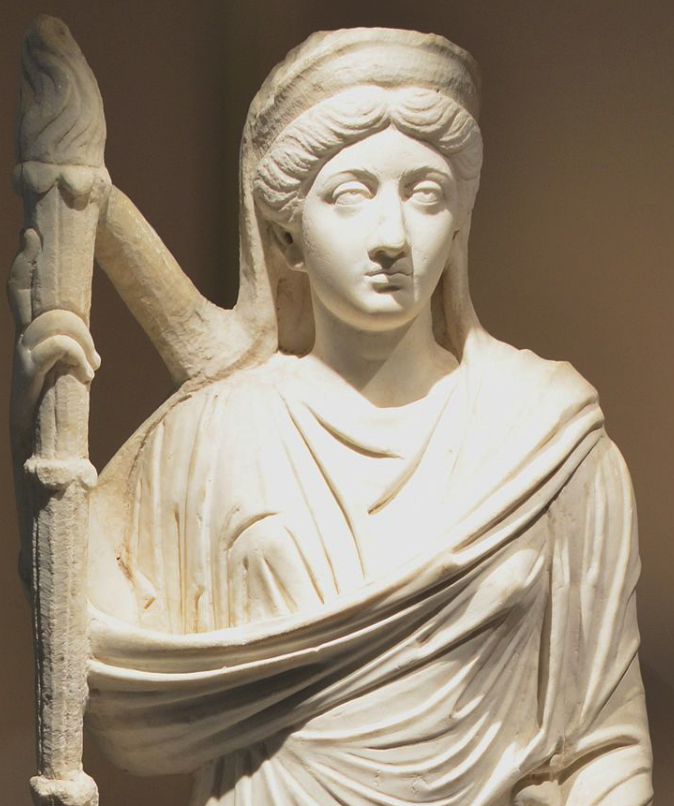
Statue of Lucilla in the Bardo Museum, Tunis
Annia Aurelia Galeria Lucilla (150-182) was the eldest daughter to survive her parents. She was born about eleven years before Commodus. As we know, she was betrothed and wed as a teenager to her father’s co-ruler, Lucius Verus. After Verus passed away from illness, perhaps from the plague his troops had brought back from the East, she was forced to marry Tiberius Claudius Pompeianus, a respected general of her father’s who was quite a bit older than her, having been born in A.D. 125.

Snapshot of family tree of Marcus Aurelius and Faustina Minor (Wikimedia Commons – Nerva/Antonine Dynasty)
Lucilla’s younger sister Annia Aurelia Fadilla (c. 159-211) was born and raised in Rome and was married to Marcus Peducaeus Plautius Quintillus, a senator, consul and augur. He was the nephew of Lucius Verus, but also became one of Commodus’ main advisors.
Fadilla and her family lived in a private palace on the Capitoline Hill, and it was she whom the ancient author, Herodian, says warned Commodus about the snaky freedman, Cleander, and a plot upon the emperor in 189.
But more on plots later…
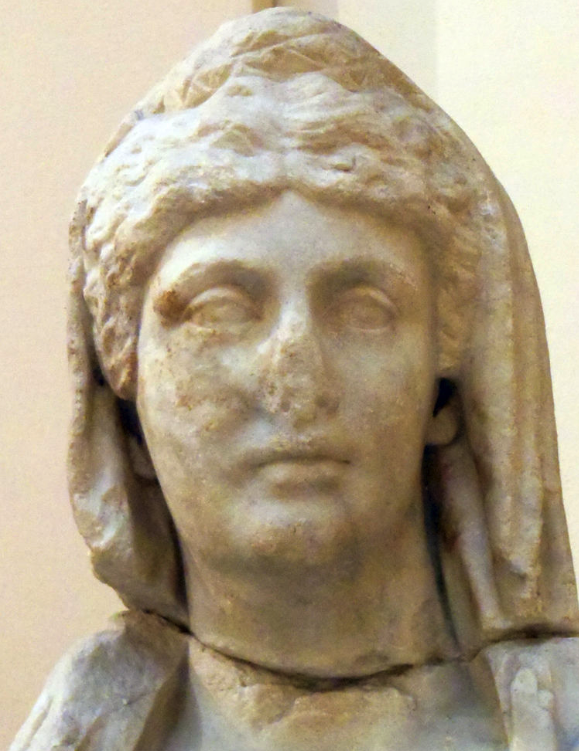
Annia Cornificia Faustina Minor – sister of Commodus and Lucilla
Another sister of Commodus and Lucilla was Annia Cornificia Faustina Minor (160-112). She was married to an African Roman by the name of Marcus Petronius Sura Mamertinus who was consul in 182. This Faustina Minor and her family may have been with her father, Marcus Aurelius at the time of his death in Germania.
Around 190 or 192, Commodus ordered the deaths of Faustina Minor’s husband, son, and most of her in-laws. So, relations with her brother were strained at best. But, she survived Commodus’ reign, and even had an affair with the short-lived Emperor Pertinax. She lived into her fifties until, in A.D. 212, her death was ordered by Emperor Caracalla. Rather than be executed, this daughter of Marcus Aurelius committed suicide.
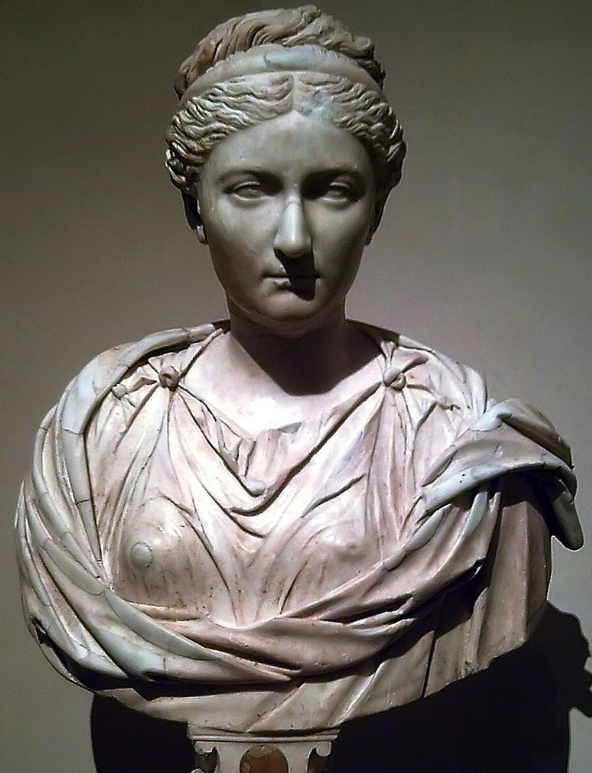
Vibia Aurelia Sabina – youngest sister of Commodus and Lucilla (Wikimedia Commons)
The youngest and longest surviving child of Marcus Aurelius and Faustina Minor was Vibia Aurelia Sabina (c. 170-216). She was born in Pannonia and travelled much throughout the empire.
The image we have of young Sabina is of an innocent, kind girl growing up with chaos all around her. Before her father’s death in 180, she was betrothed to an African Roman senator by the name of Lucius Antistius Burrus from near Hippo Regius. They were eventually married in Rome, after which Sabina moved to North Africa with her husband.
Despite a problem with her husband, which we will get into shortly, Sabina went on to marry Lucius Aurelius Agaclytus, a freedman of her father’s who may have foiled a plot against Marcus Aurelius. They had no children, but Sabina became a prominent Italian citizen of Roman North Africa who was well-loved by the Romans and native Berber population. She fared much better than her sisters.
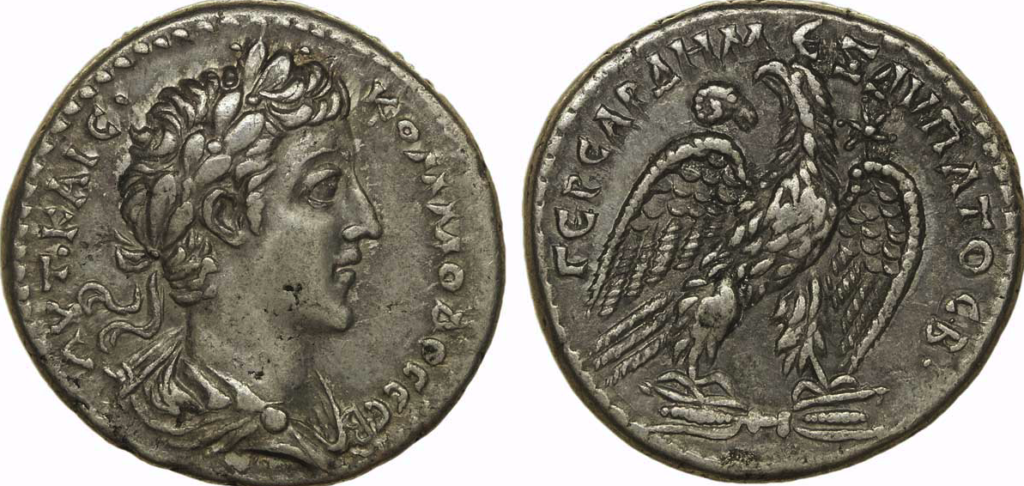
Denarius of Commodus
And what of Commodus, the ruler at the centre of this family of orphan Aurelii?
Well, Commodus comes across as someone who was given too much power far too early, kind of like a child star who hits it big at a young age and then spirals out of control.
At the age of fifteen, in A.D. 177, Commodus became joint ruler with his father and was given the titles of ‘Caesar’, ‘Imperator’ and ‘Augustus’.
Cassius Dio, a contemporary of the period, gives us an account of his character:
This man [Commodus] was not naturally wicked, but, on the contrary, as guileless as any man that ever lived. His great simplicity, however, together with his cowardice, made him the slave of his companions, and it was through them that he at first, out of ignorance, missed the better life and then was led on into lustful and cruel habits, which soon became second nature. And this, I think, Marcus clearly perceived beforehand. Commodus was nineteen years old when his father died, leaving him many guardians, among whom were numbered the best men of the senate. But their suggestions and counsels Commodus rejected, and after making a truce with the barbarians he rushed to Rome; for he hated all exertion and craved the comfortable life of the city.
(Cassius Dio, The Roman History, Book LXXIII, 1)
At first, Commodus did seem to make an attempt to rule well. He dealt (not personally) with minor problems like a Caledonian breech of the Antonine Wall in 183, and the subsequent mutiny there that was put down by Pertinax. He also organized shipments of agricultural produce from Africa to Rome, and freed the tenants of Roman growers in that province from a sort of servitude.
But these small gestures, it seems, were not enough to dissuade his detractors or would-be assassins.

The Roman Forum (by Becchetti)
Commodus devoted most of his life to ease and to horses and to combats of wild beasts and of men. In fact, besides all that he did in private, he often slew in public large numbers of men and beasts as well. For example, all alone with his own hands, he dispatched five hippopotami together with two elephants on two successive days; and he also killed rhinoceroses and a camelopard. This is what I have to say with reference to his career as a whole.
(Cassius Dio, The Roman History, Book LXXIII, 9)
And what of his siblings? How did they feel about their emperor/brother?
We already know that Fadilla helped to foil a plot by Cleander against her brother in 189, but not all of Commodus’ sisters were so forgiving of their brother.
The plot we do know of for certain is that of Lucilla’s. Hers was the first plot against Commodus.
In A.D. 182, Lucilla and her cousin, Ummidius Quadratus, a Roman senator, plotted to kill Commodus and place Lucilla’s stepson, Pompeianus (son of her husband, the old general Tiberius Claudius Pompeianus) upon the imperial throne. It is supposed that Lucilla and her stepson may even have been intimately involved.
It must have been the case that Commodus quickly showed himself to be incapable of rule, for Lucilla and her fellow conspirators wasted little time in plotting. However, the assassination attempt was badly botched and the younger Pompeianus and Quadratus were executed, and Lucilla was exiled to the island of Capri where she was later murdered at her brother’s command.
Oddly enough, Lucilla’s husband, the elder Pompeianus, was not punished, even though it was his son she had tried to put on the throne. The general subsequently retired.
The historian, Herodian, describes the failed plot:
He sent out to rule the provinces men who were either his companions in crime or were recommended to him by criminals. He became so detested by the senate that he in his turn was moved with cruel passion for the destruction of that great order, and from having been despised he became bloodthirsty.
Finally the actions of Commodus drove Quadratus and Lucilla, with the support of Tarrutenius
Paternus, the prefect of the guard, to form a plan for his assassination. The task of slaying him was assigned to Claudius Pompeianus, a kinsman. But he, as soon as he had an opportunity to fulfil his mission, strode up to Commodus with a drawn sword, and, bursting out with these words, “This dagger the senate sends thee,” betrayed the plot like a fool, and failed to accomplish the design, in which many others along with himself were implicated. After this fiasco, first Pompeianus and Quadratus were executed, and then Norbana and Norbanus and Paralius; and the latter’s mother and Lucilla were driven into exile.
(Herodian, Historia Augusta, The Life of Commodus, 3-4)
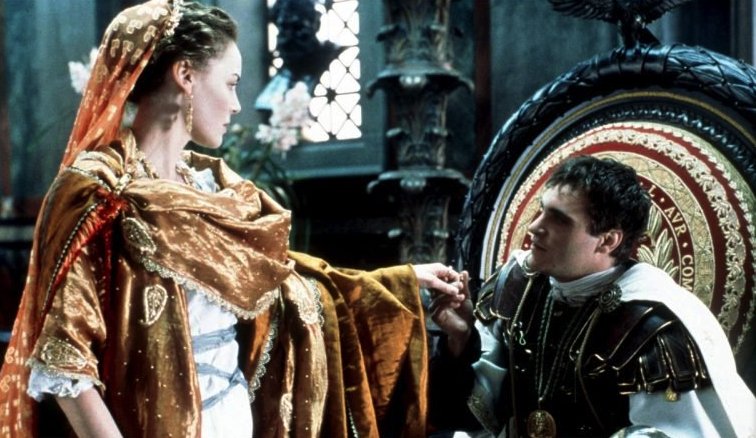
Lucilla and Commodus in the movie Gladiator
It is not known whether Lucilla had been in touch with her younger sisters about the plot against Commodus. One supposes that they did not know, especially Fadilla, who would save him from Cleander later, or Sabina who was just twelve years old at the time.
What we do know is that after Lucilla’s betrayal, things changed for the worse in Commodus. The failed plot seemed to have ushered in a reign of terror. He became more hostile toward the senate and executed many, including his chief advisor Tigidius Perennis in 185, whom he replaced with Cleander.
Commodus, at this time, also came under the influence his mistress, Marcia, and his chamberlain, Eclectus. He tried to appease the populace by putting on extravagant games and shows, and to ingratiate himself to the troops by increasing their pay. All of this led to a huge financial crisis.
And what did he do to alleviate the situation? He confiscated the property of the rich.
Commodus was good at making enemies.
But his megalomania went even further, for he renamed Rome ‘Colonia Commodiana’ (Commodus’ Colony), and came to believe that he was Hercules incarnate.
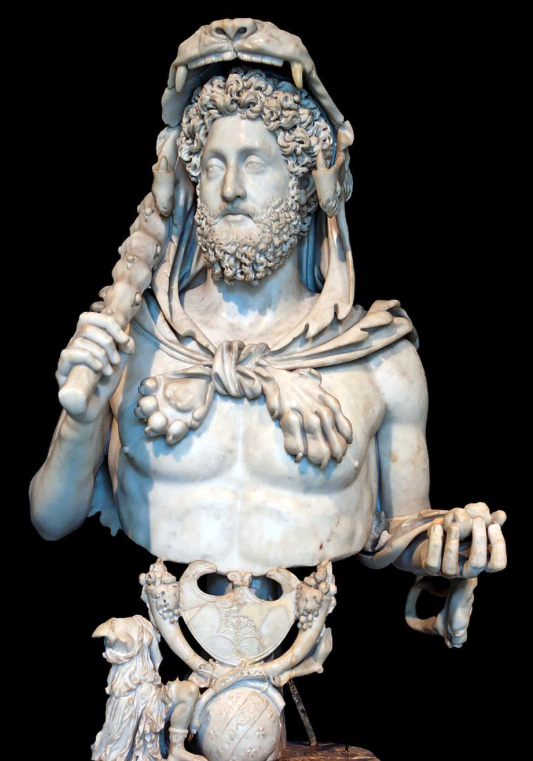
Commodus as Hercules
Now this “Golden One”, this “Hercules”, this “god” (for he was even given this name, too) suddenly drove into Rome one afternoon from his suburb and conducted thirty horse-races in the space of two hours. These proceedings had much to do with his running short of funds. He was also fond, it is true, of bestowing gifts, and frequently gave largesses to the populace at the rate of one hundred and forty denarii per man; but most of his expenditures were for the objects I have mentioned. Hence he brought accusations against both men and women, slaying some and to others selling their lives for their property. And finally he ordered us, our wives, and our children each to contribute two gold pieces every year on his birthday as a kind of first-fruits, and commanded the senators in all the other cities to give five denarii apiece. Of this, too, he saved nothing, but spent it all disgracefully on his wild beasts and his gladiators.
(Cassius Dio, The Roman History, Book LXXIII, 16)
Commodus’ increasing brutality, as well as his neglect of duty, drove other parties to seek his end. In 188 another conspiracy against him came about, but this time it involved the husband of Commodus’ youngest sister, Sabina.
Unbeknownst to Sabina, who was just eighteen years old at the time, Lucius Antistius Burrus plotted with others against Commodus. Details about this plot are lacking, but we do know that it failed and that Burrus was put to death.
Sabina, however, was spared, perhaps because she was not involved in the plot. She remained in North Africa and married Agaclytus to survive the rest of her family until A.D. 217.
The year after Burrus’ plot against Commodus, in 189, there came the plot that was set by Cleander, and foiled by Fadilla and, according to Herodian, another sister, possibly Faustina Minor, whose family had not yet been executed by her brother.
One can imagine the paranoia that must have beset Commodus (and indeed his sisters!) at this time, and how it would have fuelled the fires of his mania.
All plots upon Emperor Commodus had failed to that point, and many people had been executed in the wake of those failures…that is…until the very end of A.D. 192.
On New Year’s Day, in A.D. 193, Commodus was due to present himself to the people of Rome as Consul and Gladiator. He had reached new heights of violence at that point in time, and had become a threat to everyone.
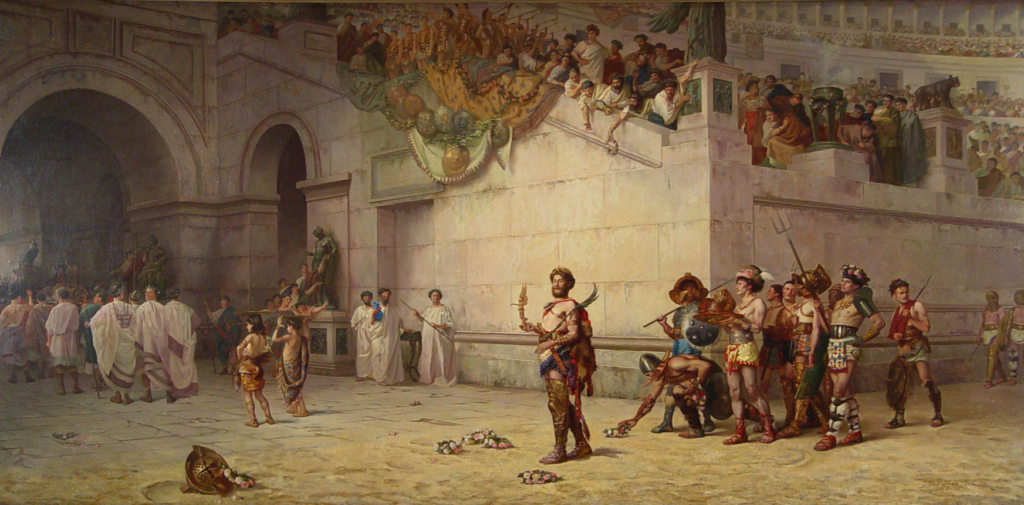
The Emperor Commodus Leaving the Arena at the Head of the Gladiators (by Edwin Howland Blashfield)
Cassius Dio was present at that time, and gives us our most detailed, surviving account of the day and the plot involving many players, including Commodus’ mistress, Marcia, his chamberlain, Eclectus, the Praetorian Prefect, Aemilius Laetus, and a famous athlete by the name of Narcissus:
This fear was shared by all, by us senators as well as by the rest. And here is another thing that he did to us senators which gave us every reason to look for our death. Having killed an ostrich and cut off his head, he came up to where we were sitting, holding the head in his left hand and in his right hand raising aloft his bloody sword; and though he spoke not a word, yet he wagged his head with a grin, indicating that he would treat us in the same way. And many would indeed have perished by the sword on the spot, for laughing at him (for it was laughter rather than indignation that overcame us), if I had not chewed some laurel leaves, which I got from my garland, myself, and persuaded the others who were sitting near me to do the same, so that in the steady movement of our armies we might conceal the fact that we were laughing.
After the events described he raised our spirits. For when he was intending to fight once more as a gladiator, he bade us enter the amphitheatre in the equestrian garb and in our woollen cloaks, a thing that we never do when going to the amphitheatre except when one of the emperors has passed away; and on the last day his helmet was carried out by the gates through which the dead are taken out. These events caused absolutely every one of us to believe that we were surely about to be rid of him.
And he actually did die, or rather was slain, before long. For Laetus and Eclectus, displeased at the things he was doing, and also inspired by fear, in view of the threats he made against them because they tried to prevent him from acting in this way, formed a plot against him. It seems that Commodus wished to slay both the consuls, Erucius Clarus and Sosius Falco, and on New Year’s Day to issue forth both as consul and secutor from the quarters of the gladiators; in fact, he had the first cell there, as if he were one of them. Let no one doubt this statement. Indeed, he actually cut off the head of the Colossus, and substituted for it a likeness of his own head; then, having given it a club and placed a bronze lion at its feet, so as to cause it to look like Hercules, he inscribed on it, in addition to the list of his titles which I have already indicated, these words: “Champion of secutores; only left-handed fighter to conquer twelve times (as I recall the number) one thousand men.”
For these reasons Laetus and Eclectus attacked him, after making Marcia their confidant. At any rate, on the last day of the year, at night, when people were busy with the holiday, they caused Marcia to administer poison to him in some beef. But the immoderate use of wine and baths, which was habitual with him, kept him from succumbing at once, and instead he vomited up some of it; and thus suspecting the truth, he indulged in some threats. Then they sent Narcissus, an athlete, against him, and caused this man to strangle him while he was taking a bath. Such was the end of Commodus, after he had ruled twelve years, nine months, and fourteen days. He had lived thirty-one years and four months; and with him the line of the genuine Aurelii ceased to rule.
(Cassius Dio, The Roman History, Book LXXIII, 21-22)
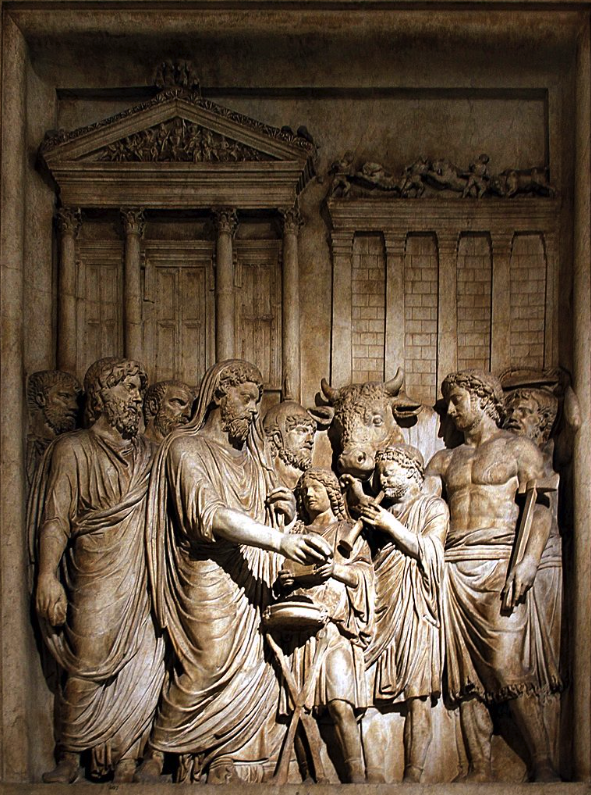
Marcus Aurelius and family performing a sacrificium
It is a pathetic end to the rule of the dynasty, and one can’t help but wonder how Commodus’ surviving sisters – Fadilla, Faustina Minor, and Sabina – felt once their brother was gone. Faustina Minor may have felt justice had been done, even if she may not have been involved, for she had lost her family to her brother’s brutality. But Fadilla had saved him previously, and Sabina probably barely knew him. The dangers to the three of them would come later, during the reign of the winning dynasty in the subsequent civil war, the Severan dynasty, and the rule of Caracalla, another son who was not the ruler that his father was.
What was it about imperial fathers and their lesser sons?
Marcus Aurelius, by all accounts was a wise man, and yet, despite having inherited the imperial throne through adoption, he appointed a lesser person as his successor. The same occurred with Septimius Severus when he appointed his two sons Caracalla and Geta to succeed him. Severus even sought to repair the image of Commodus in 195, even going so far as to deify him!
Under Aurelius and Severus, the empire reached great heights, and yet it could hardly have fallen lower under each of their sons.
But such is the world of family and politics in ancient Rome. It doesn’t always make sense to us today, but it certainly is fascinating and entertaining.

We do hope you’ve enjoyed The World of The Dragon: Genesis blog series.
If you’ve missed any of the posts in this seven-part series, you can read them all together HERE.
If you have not already downloaded your FREE COPY of The Dragon: Genesis, you can do so by CLICKING HERE.
Lastly, if you have read the book, please consider leaving a small review or comment at the bottom of the page HERE.
Eagles and Dragons Publishing will be taking a short summer break but will be returning in a few weeks with more posts about history and some exciting, highly-anticipated releases.
Stay tuned… Happy Summer, and thank you for reading.

















